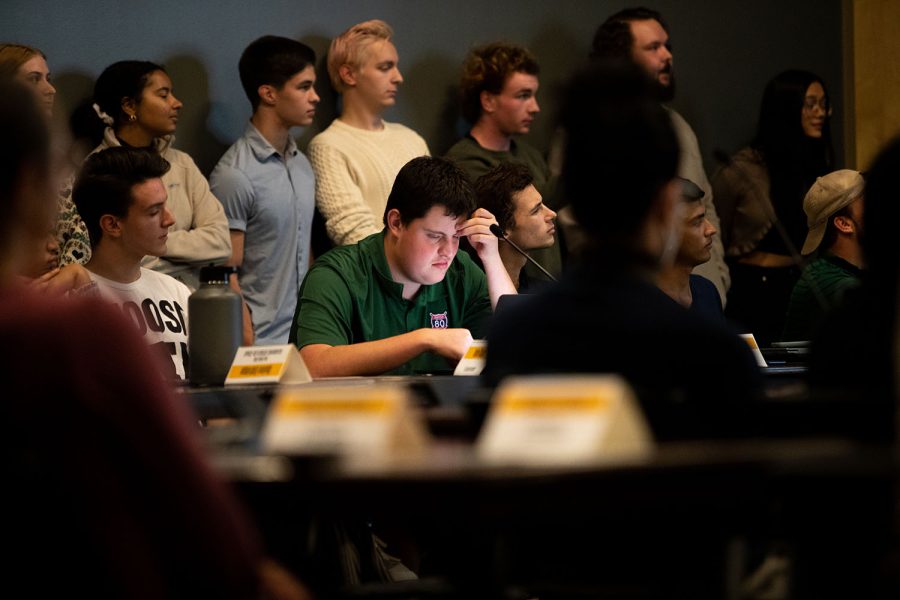USG unanimously passes resolution to support documented Dreamer students
The resolution is meant to support the America’s Children Act and voice the University of Iowa Undergraduate Student Government’s support for the act to Iowan representatives.
Senators listen at a University Student Government meeting Sept. 27, 2022.
November 30, 2022
The University of Iowa Undergraduate Student Government unanimously passed legislation to support documented Dreamers at its meeting Tuesday night, voicing the government’s support for the America’s Children Act and the bipartisan age-out protections in the NDAA.
Introduced by Sen. Mae Barron and Sen. Tejaswini Kannan, the resolution is meant to ask Iowan lawmakers to support protections for documented Dreamers, who are children of long-term visa holders.
“These children do not have an advantage of securing permanent residency because of unprecedented backlogs and are forced to self-deport or get a student visa in order to continue their education, which puts them behind on their path to citizenship,” Kannan said.
The resolution is meant to support the America’s Children Act, which is an act with four provisions that was introduced in the U.S. House of Representatives and the U.S. Senate this previous year. The provisions include the following steps:
- If a child has been a dependent on a long-term visa and has been in this country for 10 years and has graduated from an American university, the child gets a pathway to get a Green Card.
- The child will no longer be able to age out of the visa system, a mechanism that previously would kick students off of their parents’ applications upon their 21st birthday. Their age will lock at the age that they were when their parents filed.
- Children of long-term visa holders who are at least 16 years old get work authorization if they have a pending green card application.
- This serves as a retroactive bill and will apply to those who have already aged out.
Barron and Kannan invited three documented Dreamer students — Pareen Mhatre, Maneesh John, and Kartik Sivakumar — to share their rationale on the bill’s importance in addition to their own stories.
Mhatre said there is a decades-long backlog for Green Cards, given the U.S. law that puts a 7 percent cap on employment-based immigration from countries such as India, China, the Philippines, and Mexico. A Green Card allows for permanent residency in the United States.
“There are about 250,000 children in the United States who share our statuses who were brought to this country at an average age of five,” Mhatre said.
While documented Dreamers can attend college and are still considered dependent on their parents through the law, once they turn 21, the law indicates they have to self-deport if they don’t possess a visa. This is a problem Mhatre ran into.
Self-deportation occurs after visas expire and if people cannot attain new tourist, work, or student visas. Those who self-deport arrange travel back to their country of origin where they may resume the immigration process.
“I was told by my lawyer, by the government, and by the university that if my student visa did not arrive by the time my next semester started, I would have to self-deport,” Mhatre said.
With the student visa, Mhatre gained a social security number and was able to work, but her path to citizenship still wasn’t guaranteed.
“Fortunately, I was able to find a community and join Improve the Dream, and I realized that I wasn’t alone in this situation,” Mhatre said. “There were hundreds of thousands of kids like me, and that made me even more passionate about this issue and wanted to help fight for kids like me because I knew that it was unfair.”
Improve the Dream is a youth led organization that works to raise awareness about documented dreamers and the challenges of aging out of the immigration system.
However, not all student visas get accepted. For Sivakumar, he had to self-deport himself to India during his last semester of his college senior year.
“I was stuck in sort of like a legal limbo where I wasn’t sure if I should go to legal proceedings or just move back to India to apply because legal processing is extremely uncertain and expensive,” Sivakumar said.
Immigration law also can force “Dreamers” to have to choose between their education and attending events such as family weddings and funerals.
For John, making that decision is difficult.
“Because of the backlog, I’m still on student visas dependently, and my family’s still on work visas. So out of all of us, only my dad can go back [to India]. So that’s been tough on me, and I don’t want any other students to have to make a decision,” John said.
Sen. Amisha Mohanty spoke in affirmation of the resolution, describing her own immigration experiences as someone who previously lived in India and only moved back to the U.S. two years ago. Mohanty was originally born in Massachusetts.
“The only reason that I didn’t face the issues that documented Dreamers do is because my parents stayed here, and I happened to be born at the time they were studying,” Mohanty said.
Sen. Ahava Atar also spoke in affirmation of the bill following the testimonials of the three speakers.
“This really opened my eyes,” Atar said. “I didn’t even know that this was as big of an issue as it was.”



